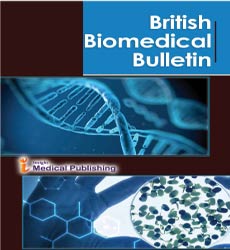ISSN : 2347-5447
British Biomedical Bulletin
Genetics at the Core of Modern Medicine: A Path to Personalized Care
David Chang*
Department of Genetics, Texas University, Texas, USA
- *Corresponding Author:
- David Chang
Department of Genetics, Texas University, Texas,
USA,
E-mail: chang_d@gmail.com
Received date: August 22, 2024, Manuscript No. IPBBB-24-19666; Editor assigned date: August 26, 2024, PreQC No. IPBBB-24-19666 (PQ); Reviewed date: September 09, 2024, QC No. IPBBB-24-19666; Revised date: September 16, 2024, Manuscript No. IPBBB-24-19666 (R); Published date: September 23, 2024, DOI: 10.36648/2347-5447.12.3.58
Citation: Chang D (2024) Genetics at the Core of Modern Medicine: A Path to Personalized Care. Br Biomed Bull Vol.12 No.3: 58.
Description
Genetics, once confined to the study of inheritance and biological traits, has rapidly evolved into a fundamental of modern medicine. With the completion of the human genome project and advancements in genomic technologies, our understanding of genetics has transcended the study of mere hereditary traits. Today, genetics plays an integral role in diagnosing, preventing and treating diseases, offering a future where precision medicine might redefine healthcare. The importance of genetics extends beyond inheritance. Mutations or variations in genes can significantly affect biological functions, leading to a host of diseases. For example, single-gene disorders like cystic fibrosis and sickle cell anemia result from mutations in a single gene, while complex conditions like diabetes and heart disease involve interactions between multiple genes and environmental factors. In recent years, advances in genetic research have revolutionized the field of diagnostics.
Genetics in disease diagnosis and management
Traditional diagnostic methods often rely on clinical symptoms and observable conditions, but genetic testing now allows for earlier detection and intervention, often before symptoms arise. This is especially beneficial in cases of hereditary cancers, such as BRCA1 and BRCA2 mutations, which are linked to a higher risk of breast and ovarian cancers. Individuals with these mutations can undergo preventive measures, such as increased screening or prophylactic surgeries, potentially saving lives. In addition to identifying disease risks, genetic testing can guide treatment decisions. Pharmacogenomics, a branch of genetics, explores how an individual's genetic makeup affects their response to drugs. This is particularly relevant in cancer treatment, where therapies can be customized based on genetic mutations within the tumor. For instance, targeted therapies like trastuzumab (Herceptin) are effective in breast cancer patients whose tumors overexpress the HER2 gene. Such precision medicine is prepare for more personalized and effective treatments, minimizing adverse reactions and improving outcomes.
Ethical dilemmas of genetic information
Despite the potential of genetics in medicine, its advancements bring forth ethical challenges. Genetic testing can provide invaluable information, but it can also open the door to difficult personal and societal questions. Moreover, the growing field of gene editing, particularly the CRISPR-Cas9 technology, has raised questions about the morality of altering human genes. While gene editing holds the potential to correct genetic defects and cure previously untreatable diseases, it also introduces the possibility of designer babies, where genetic traits might be modified for non-medical reasons. The line between therapeutic and enhancement purposes remains blurry, sparking debate about the future of genetic manipulation. Looking ahead, the integration of genetics into everyday healthcare will likely deepen. Genome sequencing is becoming more accessible, with costs dropping significantly over the past decade. As a result, it is foreseeable that genomic testing could become a routine part of medical care, allowing for personalized health plans that cater to an individual's genetic risks and strengths. In areas like oncology, the potential for genetics-driven treatments is immense. The ability to sequence tumor DNA and match it with targeted therapies could revolutionize cancer care, turning what was once a one-size-fits-all approach into a highly personalized journey. Furthermore, genetic research is expanding our understanding of complex diseases like alzheimer’s, where multiple genes and environmental factors play a role. As we uncover method the genetic underpinnings of these conditions, new method for treatment and prevention are likely to emerge. The field of genetics is ushering in a new era in medicine, one marked by the promise of precision, prevention and personalization. As our understanding of the human genome deepens, so too will our ability to diagnose and treat diseases more effectively. However, alongside these advances come ethical and societal considerations that must be addressed to ensure the responsible use of genetic information. In this rapidly evolving landscape, a tool for healing and a source of extreme questions about the future of humanity.
Open Access Journals
- Aquaculture & Veterinary Science
- Chemistry & Chemical Sciences
- Clinical Sciences
- Engineering
- General Science
- Genetics & Molecular Biology
- Health Care & Nursing
- Immunology & Microbiology
- Materials Science
- Mathematics & Physics
- Medical Sciences
- Neurology & Psychiatry
- Oncology & Cancer Science
- Pharmaceutical Sciences
